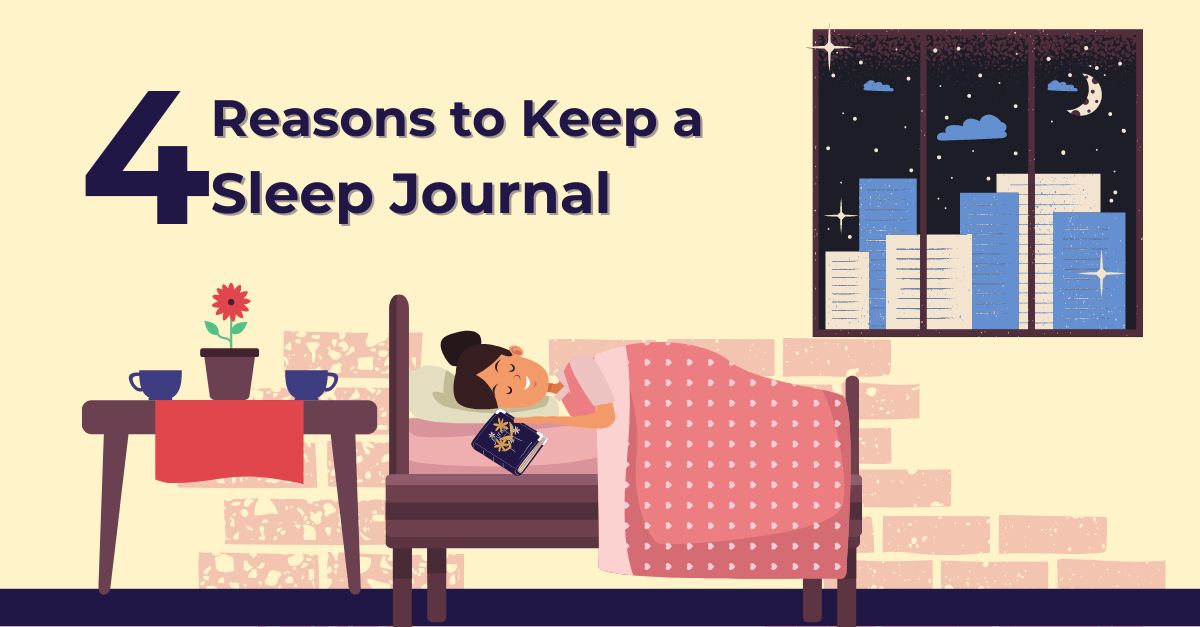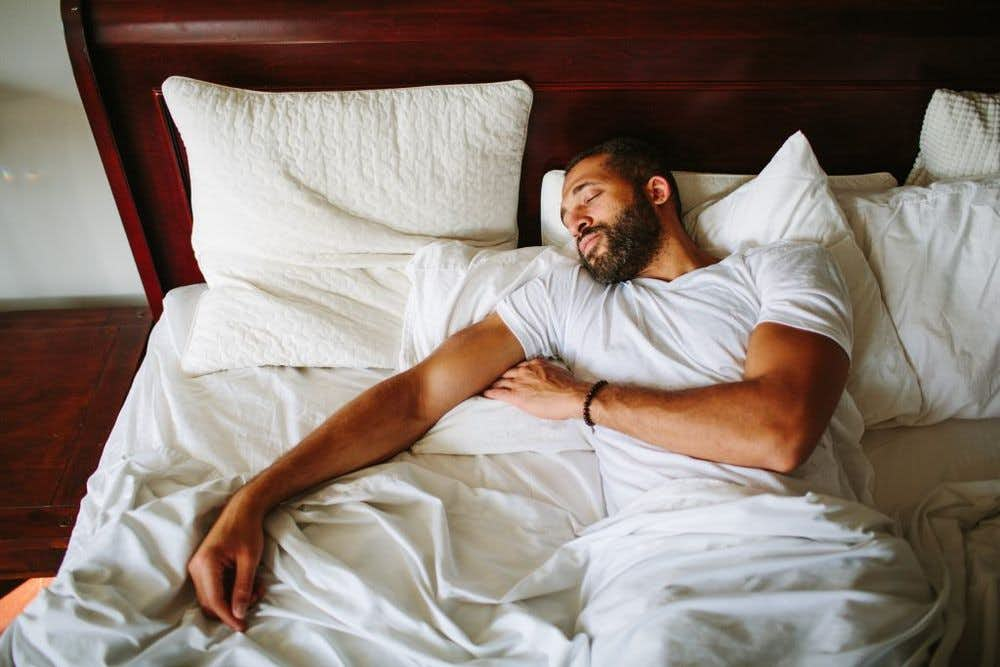July 20th, 2022

Journaling is a favorite pastime for many, with 1 out of every 6 people considering themselves an active journalist. There’s something therapeutic and empowering about writing down your most private and intimate thoughts and feelings. But keeping a journal isn’t just about sorting through your feelings (although this is an important component). Journaling can also help you set and achieve your goals, improve cognitive function, reduce stress, increase confidence, and track progress.
It’s this last benefit that we’ll focus on in today’s article when discussing four reasons to keep a sleep journal. Whether you’re struggling to fall and stay asleep or trying to identify insomnia triggers, a sleep journal can help track and monitor both your progress and setbacks.
Keep reading to learn more about how to keep a sleep journal and four reasons it may be the key to achieving quality sleep.

Sleep journals help track and monitor your sleep patterns and habits over an extended period of time. In most cases, these journals are used to help diagnose and treat common sleep disorders including insomnia, sleep apnea, sleepwalking, and RLS (restless leg syndrome).
Kept over the course of a few weeks, a sleep journal shows your healthcare professional how well or poorly you sleep and for how long. It also identifies what thoughts and behaviors may be helping or hurting your sleep. The idea that changing these thoughts and behaviors can improve your sleep quality is the basis of cognitive behavioral therapy for insomnia. Once a diagnosis is made, you can formulate a treatment plan that addresses your specific needs and patterns. Most doctors will ask that you continue using the journal to see if the proposed treatment is working. This journal may differ slightly from your original one and will read more like a log of facts and figures than an explanation of thoughts and behaviors.
Keeping a sleep journal is fairly easy. Your doctor will determine what information to keep in your initial sleep journal, but common entries might include:
It’s important to be consistent with your entries. Keep your sleep journal and a pen or pencil beside the bed and try documenting your results within one hour of waking up. You can also keep track digitally using a phone or tablet.
Now that you know more about what a sleep journal is and how it’s used, let’s discuss the main benefits of keeping one.

One of the main reasons to keep a sleep journal or diary is to help diagnose a sleep disorder. Without detailed information about your specific troubles, triggers, and sleep patterns, a doctor or sleep specialist can’t make an accurate diagnosis. Vague information and estimated time frames aren’t enough. Your doctor needs to know specific details regarding the exact time you went to bed and how long it took you to fall asleep, how many times you woke up and why, and what you did prior to going to bed. All of this information plays an important role in making an accurate diagnosis and choosing the appropriate treatment plan, which may include taking a sleep aid or another sleep-inducing medication.
Everything you do (and don’t do) leading up to bedtime can negatively impact your sleep from the things you eat and drink to the time you exercise and what you consider relaxing behaviors (i.e. reading, watching television). Your everyday behaviors may be sabotaging your sleep without you even realizing it. But a healthcare or sleep specialist will instantly recognize these negative or unhealthy patterns of behavior and offer alternatives.
For example, reading before bed can tire your eye muscles and reduce anxious or stressful thoughts. However, reading on a kindle or tablet could be doing more harm than good. The blue light from electronic devices and screens stops the brain’s production of melatonin – your body’s natural sleep hormone. These lights also confuse your brain into thinking you should be awake and alert instead of preparing for sleep. Swap your digital book for a traditional hard copy. Other common mistakes include exercising too close to bedtime, lying awake in bed for longer than 20 minutes at a time, and drinking alcohol before bed in an effort to “relax”. All of these behaviors will worsen insomnia symptoms rather than improve them.

Stress and anxiety are two of the leading causes of sleeplessness. When your body comes to rest at night, your mind sees it as an opportunity to go into overdrive. All those thoughts, worries, ideas, and concerns you pushed aside during your awake hours now creep into your idle mind, causing feelings of distress and anxiety.
While most sleep journals document your actual sleep patterns, they can also be used to purge these negative, intrusive thoughts. Take a few minutes to jot down whatever’s plaguing you at the moment. The mere act of writing it down can help you let it go and move on. You can also make a short “to-do” list for the next day to help organize your thoughts and make you feel better prepared for the morning. Don’t be afraid to use your sleep journal more like a diary to track your thoughts and feelings about sleep. This information is equally as important and useful when diagnosing your sleep troubles.
The content of your sleep journal doesn’t just help with a diagnosis. It also helps with developing an effective treatment plan. Once the doctor determines what’s causing your sleep troubles and suggests a treatment plan, you’ll continue keeping a journal and monitoring your behaviors and habits. This will let both you and your healthcare professional know if it’s working or not. Pay close attention to how long you’re sleeping, how you feel when you wake up, and what nighttime behaviors are supporting your sleep plan versus sabotaging it.
Journals are a great outlet for your private thoughts, emotions, and ideas. But they’re also a useful tool in documenting your sleep troubles and arriving at a proper diagnosis. If you’re struggling with insomnia or facing long-term sleep deprivation, a sleep journal can help get to the root of your problem and help find a treatment plan that works.
At Clarity Clinic, we have highly trained staff who specialize in therapy and psychiatry services. To learn more about how we can support your mental health, call Clarity Clinic at (312) 815-9660 or schedule an appointment today.

Our Services
Virtual/Online CarePHP and IOPAdult PsychiatryChild & Adolescent PsychiatryAdult TherapyChild & Adolescent TherapyCouples CounselingFamily TherapyGroup TherapyPsychological TestingTranscranial Magnetic Stimulation (TMS)Resources
Refer a PatientCareersClinical Training OpportunitiesOur ProvidersFree Mental Health TestsCommonly Prescribed MedicationsLocationsBlogIn The NewsClarity Through CharityClarity for AllQuick Links
Patient PortalFAQsAccepted InsurancesContact us